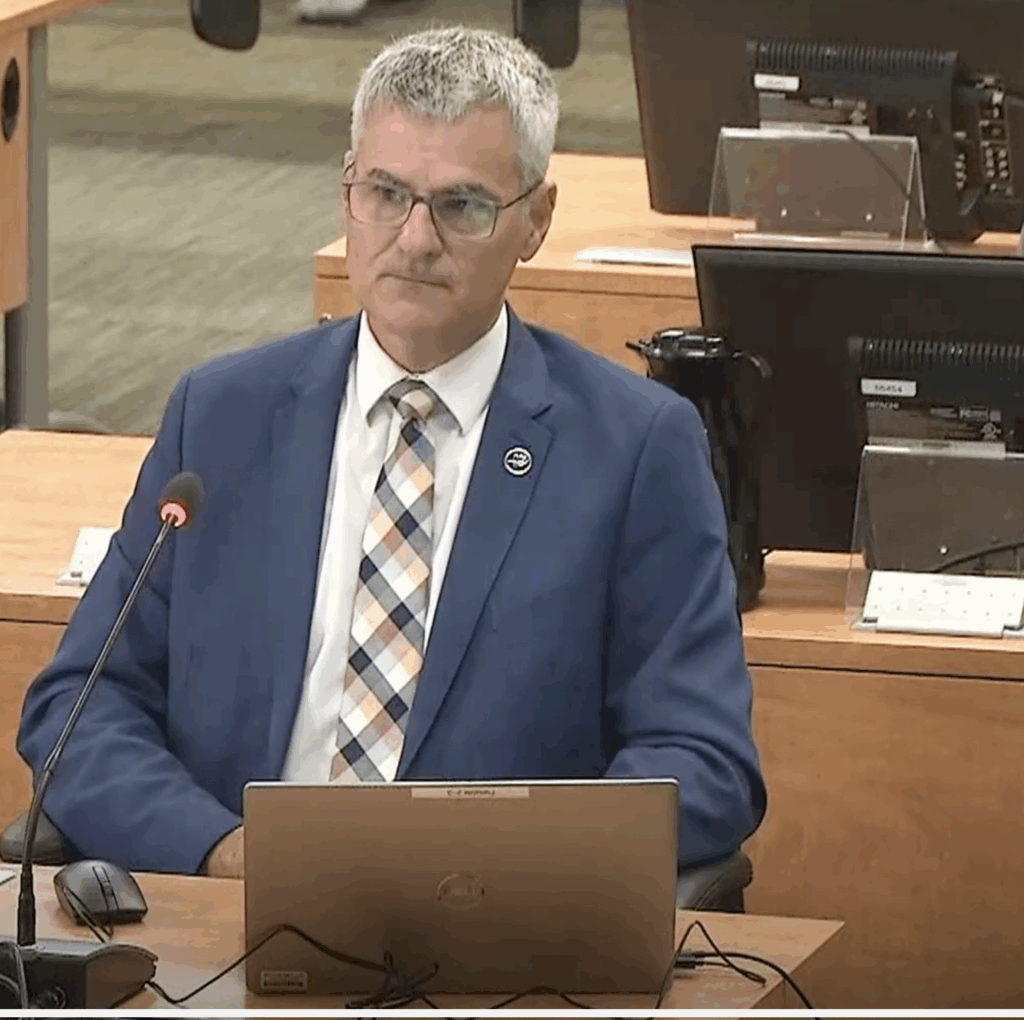Caire, LeBel relive SAAQClic fiasco for Gallant commission
Caire, LeBel relive SAAQClic fiasco for Gallant commission
Ruby Pratka, Local Journalism Initiative reporter
MONTREAL – La Peltrie MNA and former cybersecurity minister Éric Caire detailed how the SAAQClic project came crashing down around him during at times painful testimony over two days at the Gallant commission in Montreal. Caire began his testimony on the afternoon of Aug. 26 and finished it the next day.
A computer programmer by training, Caire was appointed to lead the newly created ministry in January 2022. He resigned in February 2025 after Auditor General Guylaine Leclerc revealed that the SAAQClic online platform – which had crashed on launch in February 2023 and led to chaos at Société d’assurance automobile du Québec (SAAQ) service points – was also millions of dollars over budget.
Although Transport Minister Geneviève Guilbault is technically responsible for overseeing the agency, previous testimony before the com- mission has laid out that ministers have limited oversight of Crown corporations like the SAAQ, which have independent governing boards. Caire, the self-described “minister of computers,” wound up bearing the brunt of public frustration over the SAAQClic failure.
Caire said the first inkling he had of SAAQClic’s difficulties was shortly before the 2018 election, when a Journal de Québec article hinted at delays and cost overruns. In spring 2020, a reporter asked him if he had “heard anything about CASA” as SAAQClic was known at the time. He said he hadn’t, and that at the time, the pandemic response and the cybersecurity needs of civil servants working from home took up most of the ministry’s bandwidth. In August 2020, when future SAAQ CEO Éric Ducharme – then Treasury Board secretary – told Caire the project would be delayed by at least a year, he didn’t think much of it. He testified that although his office received a note in August 2020 about “changes to the calendar, cost and scope” of SAAQClic, that note never reached him; nor did information about a “re-planning” of the project that September that would incur at least 800,000 additional staff-hours, leading to further cost overruns. He also said he wasn’t aware of “major concerns” around the project raised by Guilbault’s office in 2021, although an email presented to the commission suggested he knew SAAQClic had been “dealing with cost and deadline issues for a long time” not all of which could be explained away by the pandemic or the labour shortage.
Caire skipped a planned meeting with then-transport minister François Bonnardel that September to attend a road safety activity in his riding; he said he initially planned to schedule a follow-up but didn’t do so because “everyone [who attended the first meet- ing] seemed reassured.” He received a cost update from Karl Malenfant, then vice-president of the SAAQ, in June 2022, but was “not flabbergasted” by what he heard.
“As far as the budget was concerned, I humbly confess that I relied [on my team,]” Caire testified. “That’s not my expertise.”
After the 2022 election, Caire said he didn’t discuss SAAQClic with Guilbault, the new transport minister. However, he knew testing was not going well. The launch went ahead in early spring 2023 regardless, a decision for which Caire blamed the SAAQ leadership. It took a few days after the troubled launch for “the situation to filter through into the public space,” Caire said, at which point he, Guilbault and Premier François Legault “went into crisis mode.
“How can they [the SAAQ] order a project that sounds so exciting and deliver some- thing that’s so buggy?” Caire wondered aloud. “People are reporting hundreds of bugs to me after the system has been rolled out – as a programmer, I’ve never seen that. We didn’t do our jobs. We let a project that was all messed up be rolled out.” A post-release audit later revealed that the program was still in development at the time it was launched, the commission heard. “If the program worked as it was meant to … I’m not sure we’d be sitting here,” Caire said.
Caire resigned after Leclerc’s report came out, the only minister to do so. He needed a few minutes to compose himself before telling that part of the story.
“I was put through the spin cycle in 2023. I joke about it now, but on a human level, it was very hard for me, for my family, for my kids, for the premier,” he said. “No job is worth that. So I submitted my resignation.”
Caire remains MNA for the riding of La Peltrie, which includes Shannon, Valcartier and Sainte-Catherine-de-la-Jacques-Cartier. In February, he said he would run again. However, outside the hearing room, a rattled-looking Caire told the QCT, “We’ll see about that come election time.”
Caire was followed on the witness stand by Ducharme, health minister and former Treasury Board president Christian Dubé and current Treasury Board president Sonia LeBel, who said she and Dubé both “jumped onto a moving train” when they assumed their positions at the height of the pandemic, and she was never fully briefed about SAAQClic. She said the only leverage she had over SAAQ spending was the power to declare a hiring freeze. “The SAAQ has an autonomous budget – I don’t authorize the spending – but in the large sense it is taxpayer money,” she told the commission.
Premier François Legault testified on Sept. 2, as this newspaper was being prepared for publication.
Caire, LeBel relive SAAQClic fiasco for Gallant commission Read More »
